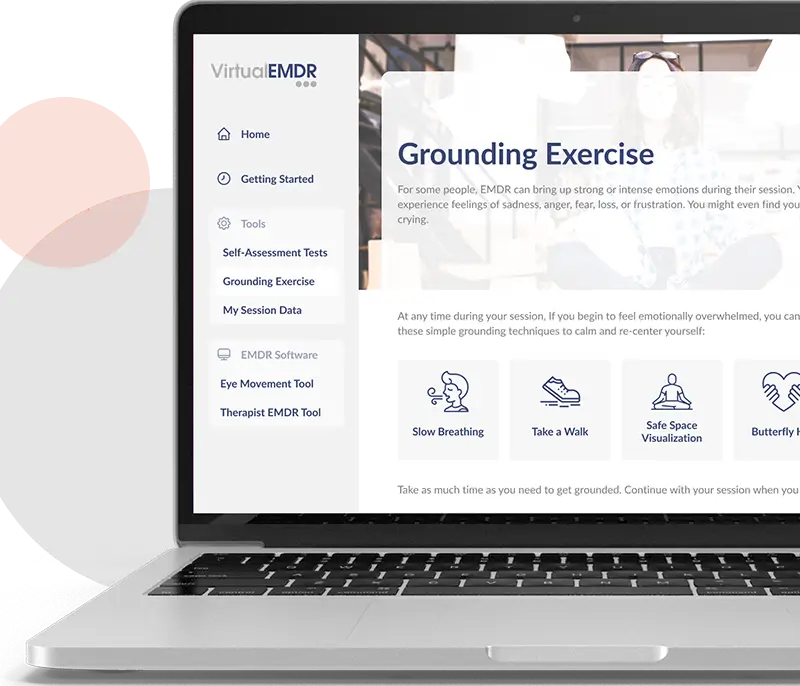What Is Self-Esteem?
Self-esteem refers to your confidence in your own worth and value.
It reflects how
you think and feel about yourself and your abilities.
Abusive or dysfunctional childhood, stressful life events, and a negative
environment,
can all contribute to low self-esteem.
Over time, low
self-esteem can lead
to mental health conditions, such
as Depression, Anxiety, and Addiction.
Symptoms of Self-Esteem Include:
Anxiety, Depression, Addictive behaviors such as overeating and drugs
Being overly critical and negative about yourself and others
Avoiding new challenges because “I can’t do it”
Place yourself in unhealthy situations to gain others’ approval
Low self-esteem affects every aspect of life and reduces the quality of your life.
Luckily, EMDR can help
you take back control and improve your Self-Esteem.
How Does Virtual EMDR
Work on Self-Esteem?

Data from 10,000 Virtual EMDR Sessions
EMDR has been successfully used to help individuals improve your Self-Esteem. It works by resolving underlying related negative self-beliefs and memories, and re-programming these to positive associations.
n addition, EMDR has been scientifically proven to treat many mental health conditions related to Self-Esteem, such as Depression, Anxiety, and Addiction. Unlike traditional treatment, Virtual EMDR works faster, is more effective, and delivers longer-lasting results. This is because EMDR addresses the root cause of Self-Esteem, not just the symptoms.
Many people report feeling a noticeable improvement in less emotional distress, even after just one session of Virtual EMDR!
Select the EMDR Protocol You Need
Virtual EMDR offers multiple EMDR Protocols to help you:
Reframe Negative Self-Beliefs that are linked to Self-Esteem
Re-program traumatic memories related to Self-Esteem
Equip yourself with Coping skills to manage difficult situations
Address conditions such as Depression, Anxiety, Addiction
In each session, simply select the EMDR Protocol you need, including protocols
for
Anxiety, Depression, Addictions, and more – all included in your Virtual EMDR
unlimited
subscription!
FREE DIAGNOSTIC TEST
Unsure if You Have
Self-Esteem Issues?
If you think you may be experiencing Self-Esteem issues,
take
this free
test.
The Rosenberg Self-Esteem Scale (RSES)
was developed in 1965,
and is widely
used by
professionals to measure
self-esteem.


# 1 ONLINE SELF-GUIDED EMDR PROGRAM
Let Virtual EMDR Help You
Overcome Low Self-Esteem
Simple, easy-to-use. Even if you have never done EMDR before.
Check out why Virtual EMDR is uniquely designed for you:


Frequently Asked Questions
I’m New to EMDR. Can I Use Virtual EMDR on My Own?
Yes definitely! Thousands of people have successfully used Virtual EMDR on their
own
without a
therapist, including beginners who have never done EMDR before.
Virtual EMDR is easy-to-follow with step-by-step guidance. You’ll be gently guided
through each stage
of EMDR, through videos, illustrations, and real-life examples.
If you get stuck or need help getting started, check out our affordable Personal
Coaching.
Can EMDR Be Combined With Other Self-Esteem Treatments?
Yes, EMDR can be used in conjunction with complementary therapy.
If you are currently undergoing treatment, consult your therapist or physician to
ensure a coordinated
treatment plan.
Are There Any Side Effects of EMDR for Self-Esteem?
Virtual EMDR has been used successfully by thousands of clients to treat Self-
Esteem
issues stemming from Childhood Trauma, relationship trauma, stress, and
other factors.
In addition, Virtual EMDR offers programs to treat effects of low self-esteem,
including Addiction,
Anxiety and Depression.
While many people find EMDR to be fast-acting and effective, some individuals may
experience temporary
increases in distress before improvement occurs. These
responses are typically
short-lived and are
part of the healing process.
How Long-Lasting Are the Effects of EMDR for Self-Esteem?
EMDR does not guarantee that you will never experience low self- esteem again.
However, EMDR has been
shown to be effective in helping you resolve negative self-
beliefs and replacing
them with empowering
positive self-beliefs. For many people,
these effects are long-lasting.
Note that the effect of EMDR can vary from individual to individual. Factors that
affect effectiveness
include: the nature and source of the issue, your environment
and personal factors
such as resilience.
However, because EMDR addresses the root cause, rather than merely relieving
symptoms, it is often
more effective and long-lasting than other treatments.

Ready to take the
Self-Esteem Test?
The Rosenberg Self-Esteem Scale (RSES) assessment was developed in 1965 by Morris Rosenberg. It is widely used by professionals to measure self-esteem among men and women, adults and adolescents.

It comprises 10 questions with 4 choices.
Estimated Time to complete: 5 minutes
Self-Esteem Test
Your Score is :










